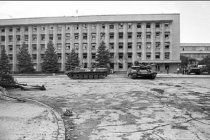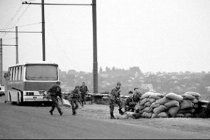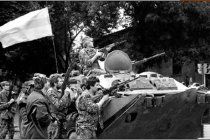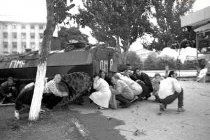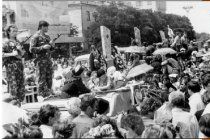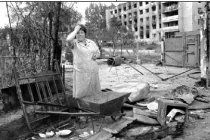 Русский
Русский English
English-







Scorched by War
Moldovan nationalists began Large-scale military operations against the people of Pridnestrovian March 1, 1992 the day a national holiday "Martisor", with a series of blatant provocation in Dubossary. The right bank attacked not only by weapons, but the strength of economic sanctions. Those were the first stirrings of what we now call economic blockade. Deputies of the Supreme Council in this situation promptly reacted to the adoption on the 9th of March of the decree "On measures to protect the economy of PMR". Its result - the beginning of settlements with the CIS countries through the accounts opened in Tiraspol cash processing center. And the next day, March 10, a young legislature adopts a new resolution, which reflected the emergency measures to normalize the situation and resolve the armed conflict with Moldova.
Pridnestrovian Deputies did everything possible to prevent the outbreak of armed conflict and strengthening. In particular, the Supreme Council proposed the Moldovan authorities to build federative relations, but they were rejected. Pridnestrovian lawmakers appealed to the international community by taking an appeal to the Secretary-General of the United Nations, the CSCE, the parliaments and governments of the world. The document included requests for recognition of statehood of Pridnestrovie. But the international community has been deaf to the pleas of Pridnestrovians. Fights in villages Cocieri and Cosnita of Dubasari district were especially violent at that time. Even during the conduct of the most brutal battles leadership of PMR was ready to "immediately begin negotiations on a political settlement with the participation of intermediaries".
Deputies of the Supreme Council of the war considered that the more they know about the Moldovan-Pridnestrovian conflict, the faster it will come to an end. March 11 Chairman of the Supreme Council of PMR Gregory Maracutsa sent telegram to Ambassador, in Moscow, representing Australia, Bulgaria, Hungary, Canada, the USA, Turkey, France and Germany.
March 24 Gregory Maracutsa spoke to reporters of leading publications in Moscow.
The situation of Pridnestrovie was aggravated after Moldovan President Mircea Snegur introduced a state of emergency throughout the territory of Moldova, including what they called "Pridnestrovian region". Moldovan authorities decided to crack down on Pridnestrovians by force of arms. March 30 held an emergency session of the Supreme Council, during which addressed an ultimatum to surrender the leadership of Moldova and dissolve all the authorities of PMR. But the decree of Snegur on state of emergency was declared on the territory of the republic. At the same time lawmakers have decided to use the power of the radio center Mayak (Grigoriopol district) to inform the whole world about the situation prevailing in the republic. They also appealed to members of the 14th Army with a request to become a guarantor of security of Pridnestrovians.
Against this background, it is difficult to overestimate the support of Pridnestrovie, which sounded in the resolution of the 6th Congress of People's Deputies of Russian Federation.
The escalation of the political and military conflict led to the adoption by the Supreme Council on May 12 of the decree "On urgent measures to ensure the safety of citizens of PMR". Deputies were alarming because of the lack of clear system of multifaceted activities of all led by the president of the executive power in the sphere of defense and security. May 25 Pridnestrovian parliamentarians once again sent an appeal to the Russian colleagues. The main request was to assist in combating the armed aggression of Moldova. Along with this, a meeting of 66 Moldovian and 42 Pridnestrovian deputies took place in Tiraspol the last day of spring 1992. The goal was - to find peaceful ways to resolve conflict. However, subsequent events have shown that on the right bank they were not inclined to peace.
This is clearly demonstrated massive armed invasion of the army of Moldova in Bendery on the 19th of June. This is despite the fact: three days before the Moldovan parliament adopted a resolution "On the main principles of peaceful settlement of the armed conflict, establish peace and harmony in the eastern regions of the Republic of Moldova". 20 Deputies of Pridnestrovie has responded the June aggression of Moldova and made a statement. The document, in addition to the characteristics of the current situation in the republic, called for a CIS country to provide military and humanitarian assistance. June 23 Parliament hears the report of the chief of the national defense management Stefan Kitsak.
Following this, Russia was involved the bloodshed on the banks of the Dniester, which took the position of armed neutrality. As a result, on the 21st of July in Moscow an agreement "on the principles of peaceful settlement of the armed conflict in Pridnestrovian region of the Republic of Moldova" was signed. This momentous document in the five-month war was given final point. The Russian, Moldovan and Pridnestrovian troops began to undertake peacekeeping mission on the banks of the Dniester from August 1.



